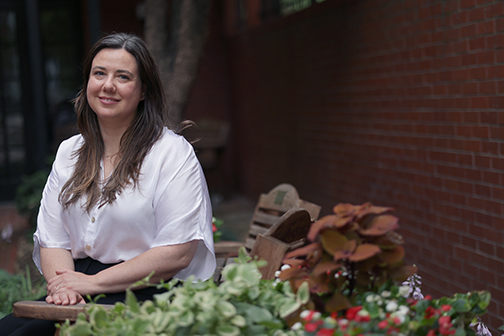Emily Hoppe uses childhood experiences—good and bad—to better prepare kids for school and, one day, parenthood themselves.
Emily Hoppe doesn’t believe in waiting around to give parents and children the best shot at a healthy relationship, at home and in a world too eager to test it. A PhD student and researcher at the Johns Hopkins School of Nursing, Hoppe focuses on cultivating this bond to both prepare at-risk kids for school and use its benefits to buffer the trauma too often passed from one generation of parents to the next.
The blossoming of that bond is why she joined nursing in the first place, arriving with ideas of becoming a midwife. “What I loved about my labor and delivery rotation [in nursing school] was being with new parents during this very significant moment in their lives, as they met their children.” But midwifery really wasn’t her calling after all.
Instead, Hoppe headed as a new RN to Johns Hopkins’ Kennedy Krieger Institute and an inpatient unit for childhood brain and spinal cord injuries “as well as pretty severe feeding disorders or kids recovering from orthopedic surgery.” It was challenging work, getting kids to the point where they could safely re-enter their lives in the community. But Hoppe was also granted a window onto the beauty and magic of childhood resilience: “A lot of times, it’s like the kids don’t even notice, especially little kids. They’re just out there living their lives.”
Meantime, Hoppe was becoming fascinated with the “psycho-biological” aspects of healing, especially that parent-child connection. “Relationships are a really key part of health—they help us to be the best people we can be, the healthiest people we can be,” Hoppe explains. “And I love that, being part of people’s lives as they build relationships with their children.”
Relationships are a really key part of health—they help us to be the best people we can be, the healthiest people we can be.
After her first year on the job, Hoppe transferred to Kennedy Krieger’s neurological-behavioral unit for kids with severe behavior disorders that occurred in the context of multiple developmental disorders, including autism spectrum disorder. Children often remain on that unit up to six months, she says, until they are ready to safely return home or move to a group home setting. It also obviously is difficult work, again made easier by the kids themselves. “This was also a job where I learned a lot about what parents face when raising a child with disabilities and the kinds of supports they need to help their children thrive.”
Hoppe was by now hooked on mental health nursing. She returned to school, earned her credentials as a psychiatric nurse practitioner, and moved on to Kennedy Krieger’s Psychiatric Mental Health Program, spending just under four years on the outpatient clinic before joining for the PhD program in August 2020.
What she learned and experienced at Kennedy Krieger remains a key part of her PhD work, building interventions that help kids with even severe behavioral issues thrive in their communities, and make their parents more prepared to deal with it all.
“My research is about adverse childhood experiences and positive childhood experiences and how those impact parenting,” both today and down the road, she says, adding that neighborhood safety is a big part of the equation. She explains that talking with parents— even just acknowledging their plight and their commitment—can begin to blunt the impacts of generational trauma.
“With parents [of kids with behavioral disorders], there’s lots of anxiety, and not just related to the child’s behavior,” she says. “It’s pretty clear that [the parents themselves] have experienced trauma. … Sometimes explaining to a parent what is happening with their child, letting them know it is not their fault, giving them some basic tools to connect with their child, and reassuring them that they’re doing a great job can make a really big difference.”
Through the PhD program, Hoppe has gotten to work alongside Professor Deborah Gross, DNSc, MS, RN, FAAN, cofounder of the successful Chicago Parent Program, and Joyce Harrison, MD, back at Kennedy Krieger’s Psychiatric Mental Health Program, on supporting parents of the youngest children to promote kids’ mental health and well-being and, if they’re struggling, researching the best interventions to get them there.
It takes patience, persistence, and maybe a little introspection. “When you typically learn psych nursing, you learn it first from the perspective of working with adults—that’s just how our education works,” Hoppe says. “For child psych, you really have to add this piece of, ‘What is developmentally expected and, also, what is developmentally expected for this child?’ It’s really individualized.”
As for the parents, it’s education, tips for navigating challenges at home and school, and once more, a receptive ear.
And on even the toughest days, Hoppe—now a parent herself—has an easy answer to “why do I do this?” at her fingertips. “I feel so fortunate to work with children. It makes every aspect of my job fun, in addition to rewarding and worthwhile.”
Learn more about the PHD program at nursing.jhu.edu/phd.

 Birth Companions Talk Doulas and Maternal Health with Mayor Brandon Scott
Birth Companions Talk Doulas and Maternal Health with Mayor Brandon Scott Earth Day: An Opportunity to Address the Environmental Injustice of Plastic Pollution
Earth Day: An Opportunity to Address the Environmental Injustice of Plastic Pollution Forging Policy: How Can Doulas Improve Black Maternal Health?
Forging Policy: How Can Doulas Improve Black Maternal Health? No. 1 Rankings for the School of Nursing and a Pipeline to the “Best Jobs”
No. 1 Rankings for the School of Nursing and a Pipeline to the “Best Jobs” Global Service Learning: Guatemala
Global Service Learning: Guatemala



